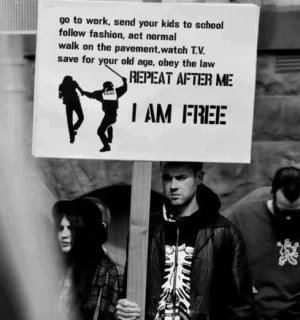Hi Chulo! Good questions -- slavery is a term that gets bandied about rather loosely, imo.
When I think of slavery, the obvious thing that comes into my mind is the slavery that existed in the US prior to the civil war. You know, the kind where people were placed on auction blocks and bidded on like property, the kind where legally people did not qualify as a whole "person", the kind where if you wanted to run away and quit your job, your "owner" could legally have you forcibly returned and brutally whipped; the kind where it was not legal for a slave to learn to read and write, the kind where children and young teenagers worked at difficult, menial tasks such as hammering nails in a blacksmith shop, or heavy agricultural labor, and the kind where families were forcibly split up and sold to distant locations where they were then unable to find each other.
That to me is the obvious, classic definition of slavery. There really was no practical escape from it at all and it required violence and struggle to end it.
I've also used slavery to define addiction, and I believe that is a valid description in some cases.
Does our system use slavery?
Well, define "our" system!

The US? The West? The whole entire world?
I understand that human trafficing exists today in certain places, including the US, though I have no personal experience with it. It ought to stop, no doubt, and that probably qualifies as slavery. This is not a legal part of the system in the US and there are many people fighting against it. You can get jail time if you get caught doing it, no? It is generally frowned upon and not part of the "system".
I know there are migrant workers and undocumented workers who are subject to abusive labor conditions. This, again, is not actually legal, so it could not be considered part of the system, could it?
I've heard there are people in the world today who willingly indenture themselves to con artists who promise to get them out of their home countries and to a better way of life -- I have heard that this happens in parts of southeast Asia, though I am fuzzy as to the details. I also understand that extremely bad labor conditions exist in the world today, particularly China. I have limited experience and understanding as to how oppressive those conditions are, never having been to China.
Those things might be considered a gray area similar to slavery? Certainly they are appalling conditions. But since these people have legal protection against it, I am not 100% sure it is the same as the antebellum form of slavery that was part of a legal, formal slavery. (?) Honestly, not sure, it is a gray area.
I've met people who are fairly well-educated, well-fed, living in a wealthy country with plenty of labor laws, and who have 40-hour a week jobs with weekends off, paid holidays and vacations, etc. etc. etc, and they bitch like its killing them, and call it slavery. THAT, imo, is pathetic, and not at all slavery.
If you have a boring or difficult job, or don't like your boss, or don't make much money, that is certainly frustrating, but it is not slavery. Sorry.
I've also noticed that some of the people I've encountered who bitch like their job is killing them, also seem to be averse to other forms of work, like taking care of their families or doing any kind of volunteer work or heaven forbid, agricultural work. Work, to me, seems to be a fact of life in just about any political or economic system, and cannot be totally eliminated as far as I can tell. Someone is always going to have to do some form of work to get food, shelter, etc. Don't you think so?
No, I am not a slave, but people have called me one! :laugh: I work, but I have significant choice in the matter, and I get many benefits and opportunities and legal protection in return. I actually enjoy work, well, most of the time, and I do not think work = slavery. (That said, if anyone is going to be giving out trust funds or free 20-year yacht vacations, sign me up, okay?)

